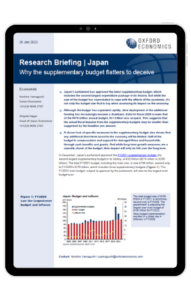Research Briefing
| Jan 26, 2022
Why Japan’s supplementary budget flatters to deceive

Japan’s parliament has approved the latest supplementary budget, which includes the second-largest expenditure package in its history. But while the size of the budget has skyrocketed to cope with the effects of the pandemic, it’s not only the budget size that is key when assessing its impact on the economy.
What you will learn:
- Although the budget has expanded rapidly, slow deployment of the additional funding has increasingly become a drawback. Data for fiscal 2020 reveals that of the ¥176 trillion annual budget, ¥31 trillion was unspent.
- A closer look at specific measures in the supplementary budget also shows that any additional short-term boost to the economy will be limited.
- Half of the budget is compensation and support for damaged firms and households through cash benefits and grants. And while long-term growth measures are a sizeable chunk of the budget, their impact will only be felt over the long term.
Tags:
Related Services

Post
US Key Themes 2026: Exceptionalism amid fragmentation
US exceptionalism is alive and well, and that won't change in 2026.
Find Out More
Post
Global Key themes 2026: Bullish on US despite AI bubble fears
We anticipate another year of broadly steady and unexceptional global GDP growth, but with some more interesting stories running below the surface.
Find Out More[autopilot_shortcode]
